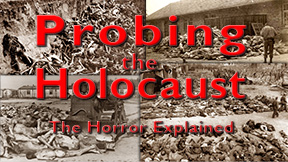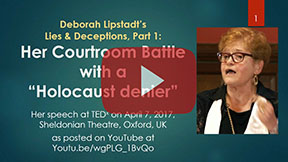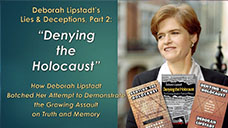Here is my public confession: I have written nasty books… some say. Others like them a lot. Read on to learn more, or browse this site at will to read and learn. Plus, those who do like my writings, if you’d like to have a signed copy of any of my books, please visit my web page dedicated to that here.
If you want to read my latest blog entry, pull it up from the top of the “Archive of Posts” on the right.
As to me, well, since I don’t think that it’s a good idea to talk about myself on my own home page (this site is full of my own stuff anyway), I have decided to hand over the virtual microphone to a friend:
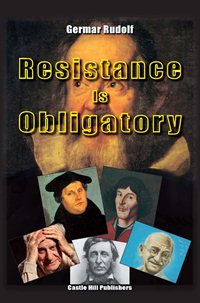
Germar Rudolf: Resistance Is Obligatory. 376 pages, 6″×9″, with color illustrations, £18/€22/$25.. A German version titled Widerstand ist Pficht appeared in March 2012. Both the English version can be downloaded as a PDF-file free of charge wie auch die deutsche Fassung als kostenlose PDF-Datei heruntergeladen werden kann!
(An extract from the foreword to my book Resistance is Obligatory, available as indicated beneath the cover image to the right.)
Galileo Revisited
By Prof. em. Dr. Daniel McGowan
The story goes that, when Galileo faced his inquisitors, they showed him the instruments of torture. Whatever else he may have been, Galileo was also a physician, so he knew what metal does to flesh, hence he recanted.
Not so Germar Rudolf.
It’s also said that, in his recantation, Galileo crawled across the floor to his accusers.
Not so Germar Rudolf.
In a letter written by Germar from his prison cell he examines why he became a Holocaust revisionist and why he was prepared to pay such a terrible price. The fact is that Germar was never much interested in World War II or the Holocaust. What interested him were the whys and wherefores of lies, delusions and propaganda. Why are they created? How are they propagated, maintained and enforced, and why do we believe in them? To him Holocaust propaganda is not a mere historical issue but rather also an ideological issue. Nor does there seem to be any single motive for his interest; rather it stems from a mixture of personal history and personality. From childhood he was blessed (or cursed) with an insane curiosity and with what he describes as “a greatly overdeveloped sense of justice.” We also learn that he was brutalized by his father.
In his typical German primary and secondary education, he touched the subject of the Holocaust several times:
“The usual claims about it seemed indubitable, undeniable to me, truth chiseled in stone, self-evident.”
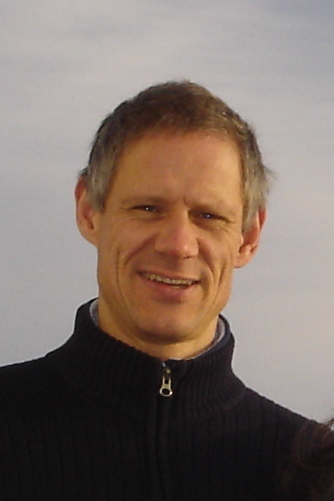
Germar Rudolf in January 2010
But in 1989 he came across the writings of Paul Rassinier,[1] a former French communist, partisan fighter, and inmate of Buchenwald and concentration camps. Rassinier heard stories after the war of mechanized exterminations in Buchenwald – a claim he knew to be untrue. He wondered, “If they can lie about that, what else can they lie about?” To the young German student, Germar Rudolf, Rassinier “opened my eyes and allowed doubts. Nothing more, just doubts.”
Germar had been raised not to doubt anything about the orthodox Holocaust narrative, which in itself maddened him, as did the increasing persecution in Germany of anyone who raised the issue.
“[…] at once I knew – and a little research confirmed it – that who doubts or dissents is relentlessly ostracized, persecuted, and even prosecuted with no chance of defense. So I said to myself, this is outrageous, unacceptable, against all norms and ideals of this society, and the fact that there is no other topic where dissent is more severely suppressed is evidence enough for me that it is also the most important topic. He who is sure of being truthful is relaxed; only liars call for earthly judges. […] I was sure I was right, and unless I was convinced by rational, scientific arguments that I was wrong, I was not going to give in. They made the mistake to provoke the blood out of me by persecuting me. That’s it. No negotiations any more. My father didn’t manage to break me with stick, whip, fists or by using me as a missile, and so they won’t break my will with violence either. It only gets stronger with every beating.”
That is Germar Rudolf: a strong-minded contrarian with enormous willpower.
“The only way to take this away from me is by killing me. Period. Anybody who punishes me for merely exercising my human right of being a human, a creature able to doubt and explore, will meet my utmost unbreakable resistance. I won’t allow anybody to reduce me to a submissive slave. Nobody.”
Revising the Holocaust Narrative
An increasing number of scholars and lay people clearly see that something is not right with Elie Wiesel and the current Holocaust narrative. The writings of Germar Rudolf and others simply confirm what they already suspect. They may care little for chemical traces in the brickwork at Auschwitz or topological evidence of mass graves, but they have seen other historical events substantially revised and they are suspicious of the outrage and scorn heaped upon those who question the uniqueness and scope of this particular event, especially when it is used to persecute Palestinians and promote endless war in the Middle East.
That Jews suffered greatly during the Third Reich is not in question, but the notion of a premeditated, planned and industrial extermination of Europe’s Jews with its iconic gas chambers and immutable six million are all used to make the Holocaust not only special but also sacred. We are faced with a new, secular religion with astonishing power to command worship. And, like Christianity with its Immaculate Conception, Crucifixion, and Resurrection, the Holocaust has key and sacred elements – the exterminationist imperative, the gas chambers, and the sacred six million. It is these that comprise the holy Holocaust which Jews, Zionists, and others worship and which Germar Rudolf and other revisionists question.
Nor is this a small matter. If it were, why the fuss? Why the witch-hunt? Why the demonization and imprisonment of David Irving, Ernst Zündel and Germar Rudolf? And it is not just these infidels. What may well be a massive lie is being used to oppress whole nations. The German and Austrian people are blamed for conceiving and perpetrating the slaughter; the Russian, Polish, Ukrainian, Lithuanian, Latvian, Estonian, Rumanian, and Hungarian people are blamed for hosting, assisting, and cheering on the slaughter; the Americans, the British, the French, the Dutch, the Belgians, the Italians, and even Diaspora Jews are blamed for not doing enough to stop the slaughter; the Swiss are blamed for profiting from it; the entire Christian world is blamed for its faith-traditions and ideologies that allowed the slaughter to take place; and more recently the Palestinian, Arab, and Muslim people are blamed for wanting to perpetuate the slaughter by delegitimizing Israel. To many the current version of the Holocaust oppresses the entire non-Jewish world and indeed much of the Jewish world as well.
Germar Rudolf is a Holocaust revisionist and a dedicated researcher of historical evidence. For him “Holocaust denier” is simply a term of abuse to be hurled as “witch” might have been hurled in the Middle Ages. But for me, “Holocaust denier” is a label with which I have been smeared for merely trying to define the term. Although I have never denied any of the three tenets of the orthodox Holocaust narrative, the mere fact that I am interested in revisionism and have actually met contemporary revisionists has caused the more cowardly of my colleagues to smear me and denigrate my reputation at Hobart and William Smith Colleges.
I first met Germar in April 2010. He had recently been released from prison in Germany and was staying in England until he could get a visa to return to his wife and child in the United States. We spent several days together along with our UK Director of Deir Yassin Remembered Paul Eisen, Henry Herskovitz from Ann Arbor, and Francis Clark-Lowes, an activist from Brighton.
Germar spoke of many aspects of the Holocaust and Holocaust revisionism that were completely new to us. We were fascinated with his struggle. He spoke about his erstwhile Catholic faith, about Germany and Germans then and now, the Third Reich and Hitler, his own present state and relationships, his hopes and fears for the future, and many other topics. Speaking fully and fluently in English and with an astonishing grasp of facts and interpretations, the hours turned into days and yet never, not once did he repeat himself.
Resistance is Obligatory
In Germar’s new book “Resistance Is Obligatory” you will read the address made by Germar to the Mannheim District Court prior to his sentence and conviction. You will see the writings of Germar on a variety of matters including truth-seeking as the essence of human dignity, the conflict between the truth-seeker and the state, the meaning of science, justice and resistance in Germany and in other countries. You will find appendices documenting numerous motions to the courts and their rejections, letters to distinguished historians and their craven and sometimes less-than-craven replies. Finally, you will hear the court’s verdict and the sentence.
Read it and Resist!
Note
[1] In Rudolf’s case it was Rassinier’s book Was ist Wahrheit?, 8th ed., Druffel, Leoni, 1982; Engl.: The Real Eichmann Trial or The Incorrigible Victors, Institute for Historical Review, Torrance 1976.



